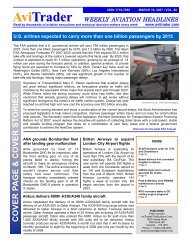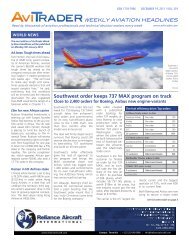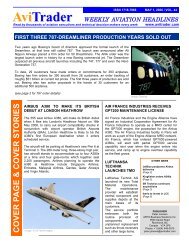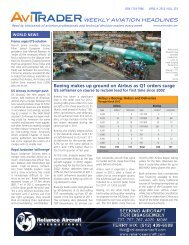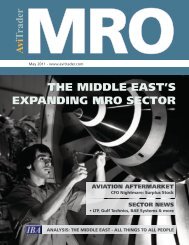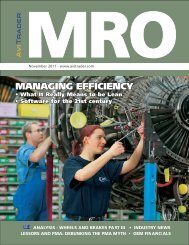The good, the bad and the ugly: the shape of things to ... - AviTrader
The good, the bad and the ugly: the shape of things to ... - AviTrader
The good, the bad and the ugly: the shape of things to ... - AviTrader
Create successful ePaper yourself
Turn your PDF publications into a flip-book with our unique Google optimized e-Paper software.
Cover S<strong>to</strong>ry - 2012: <strong>The</strong> MRO Outlook<br />
Expenditure $bn<br />
90.0<br />
80.0<br />
70.0<br />
60.0<br />
50.0<br />
40.0<br />
30.0<br />
20.0<br />
10.0<br />
0.0<br />
2011 2012 2013 2014 2015 2016 2017 2018 2019<br />
be reckoned with, as Turkey’s GDP growth is<br />
expected <strong>to</strong> remain above 4% in 2012.<br />
Fur<strong>the</strong>r capacity <strong>and</strong> capability increases have<br />
been announced at Emirates, Mu<strong>bad</strong>ala Aerospace,<br />
SIAEC, Air India (through a joint venture<br />
with Boeing) <strong>and</strong> o<strong>the</strong>r companies in <strong>the</strong> Middle<br />
East, Asia <strong>and</strong> Latin America - all aimed at<br />
accessing fast-growing markets, <strong>and</strong> most <strong>of</strong><br />
which are partly supported or subsidized by local<br />
governments or airlines.<br />
THE BATTLE FOR THE AFTERMARkET<br />
<strong>The</strong>re is no doubt that <strong>the</strong> OEMs will continue<br />
<strong>to</strong> take a large share <strong>of</strong> <strong>the</strong> aftermarket - <strong>and</strong><br />
this share will only increase as companies like<br />
American Airlines (which filed for Chapter 11<br />
bankruptcy protection last month) face new<br />
outsourcing decisions <strong>to</strong> remain competitive,<br />
according <strong>to</strong> Jason Caldwell, executive vice<br />
president <strong>of</strong> Global Sales <strong>and</strong> Marketing for<br />
<strong>the</strong> Wencor Group, a US-based global distribu<strong>to</strong>r<br />
<strong>of</strong> aftermarket parts. Large independent<br />
MROs will also gain share from this shift, he<br />
believes, <strong>and</strong> that will be critical <strong>to</strong> parts suppliers<br />
like Wencor.<br />
To capitalize on <strong>the</strong> shift, Wencor is investing<br />
heavily in its international locations, putting<br />
new leadership in place in <strong>the</strong> US, Europe <strong>and</strong><br />
Asia, where it is moving in<strong>to</strong> a new larger facility<br />
in Singapore <strong>and</strong> exp<strong>and</strong>ing its business<br />
through its Wencor Huafeng joint venture in<br />
China. “We believe much <strong>of</strong> our growth in <strong>the</strong><br />
next few years will come from our international<br />
cus<strong>to</strong>mers,” said Caldwell.<br />
To that end, Wencor has also broadened its<br />
product scope, investing in newer platforms<br />
like <strong>the</strong> 737NG, A320 family, 777 <strong>and</strong> a few<br />
o<strong>the</strong>r models which <strong>the</strong>y see as critical for <strong>the</strong><br />
MRO market over <strong>the</strong> next five years.<br />
<strong>The</strong> move <strong>of</strong> <strong>the</strong> OEMs in<strong>to</strong> <strong>the</strong> aftermarket is<br />
not a new phenomenon, particularly in <strong>the</strong> engine<br />
segment. In fact, according <strong>to</strong> MTU, approximately<br />
50% <strong>of</strong> engines are currently under<br />
contracts <strong>to</strong> OEMs, ei<strong>the</strong>r on an exclusive<br />
Projected MRO Spend by Sec<strong>to</strong>r<br />
Components Modifications Airframe (Heavy) Line/A-Checks Engine<br />
Source: IBA<br />
or non-exclusive basis, while closer <strong>to</strong> 90%<br />
<strong>of</strong> some engine models, like <strong>the</strong> Rolls-Royce<br />
Trent, are covered by an OEM Total Care-type<br />
agreement, which <strong>to</strong> a large extent go <strong>to</strong>wards<br />
providing a return on <strong>the</strong> OEM‘s original<br />
investment in developing <strong>and</strong> manufacturing<br />
<strong>the</strong> engine. What is relatively recent, according<br />
<strong>to</strong> GAMECO‘s Conrad, is <strong>the</strong> increased activity<br />
<strong>of</strong> <strong>the</strong> airframe OEMs in<strong>to</strong> <strong>the</strong> MRO market<br />
space, as well as recent moves by component<br />
manufacturers <strong>to</strong> “restrict technical data <strong>to</strong> try<br />
<strong>to</strong> control <strong>the</strong> aftermarket“.<br />
“This trend is mostly a result <strong>of</strong> <strong>the</strong> constant<br />
‘tug-<strong>of</strong>-war’ for pr<strong>of</strong>its in <strong>the</strong> industry, as OEMs<br />
look <strong>to</strong> aftermarket revenues <strong>to</strong> recover investments<br />
(<strong>and</strong> make pr<strong>of</strong>its) from developing <strong>the</strong><br />
systems on new airframes,” says Conrad. “In<br />
2012, we expect <strong>to</strong> see this trend continue.”<br />
<strong>The</strong> continuing expansion <strong>of</strong> OEM activity in<strong>to</strong><br />
<strong>the</strong> aftermarket has spurred aviation regulation<br />
agencies like <strong>the</strong> FAA <strong>to</strong> sit up <strong>and</strong> take<br />
notice. It is inevitable that <strong>the</strong> OEMs will look<br />
for a return on <strong>the</strong>ir considerable investments<br />
by exploiting <strong>the</strong> aftermarket, <strong>and</strong> an increase<br />
in <strong>the</strong>ir activity, through point-<strong>of</strong>-sale packages<br />
<strong>and</strong> o<strong>the</strong>r measures will only increase, unless,<br />
as Charles Willis, president <strong>of</strong> Willis Lease, a<br />
major engine lessor, points out, <strong>the</strong>re is a pushback<br />
from governmental authorities <strong>and</strong> / or<br />
airline trade associations.<br />
In fact, a move against OEM dominance in <strong>the</strong><br />
aftermarket has already occurred. In Oc<strong>to</strong>ber,<br />
<strong>the</strong> FAA issued a draft Policy Statement regarding<br />
what it sees as ‘unacceptable‘ requirements<br />
imposed by OEMs that publish Instructions for<br />
Continued Airworthiness (ICAs), including language<br />
that imposes ‘anti-competitive requirements<br />
as well as language that undermines <strong>the</strong><br />
FAA’s safety regime’ (see s<strong>to</strong>ry page 13).<br />
Magellan’s Fessler recognizes <strong>the</strong> OEMs’ success<br />
in ‘dipping <strong>the</strong>ir <strong>to</strong>es in<strong>to</strong> <strong>the</strong> aftermarket<br />
pool’, but says <strong>the</strong>y would do well <strong>to</strong> appreciate<br />
its ‘trading nature <strong>and</strong> nimbleness’.<br />
14<br />
<strong>The</strong> group are also writing <strong>to</strong> EASA, <strong>the</strong> European<br />
aviation st<strong>and</strong>ards agency, <strong>to</strong> ask it <strong>to</strong><br />
adopt a similar position <strong>to</strong> that <strong>of</strong> <strong>the</strong> FAA,<br />
<strong>the</strong> US aviation authority, which published<br />
a draft Policy Statement in Oc<strong>to</strong>ber seeking<br />
<strong>to</strong> restrict OEMs that publish Instructions for<br />
Continued Airworthiness (ICAs) from using<br />
<strong>the</strong>se or <strong>the</strong> ICA licensing agreements as a<br />
means for implementing certain types <strong>of</strong> unacceptable<br />
requirements.<br />
This FAA’s draft Policy Memo lays down that<br />
some language in <strong>the</strong> ICAs will be deemed<br />
unacceptable, including language that imposes<br />
‘anti-competitive requirements as<br />
well as language that undermines <strong>the</strong> FAA’s<br />
safety regime’.<br />
<strong>The</strong> group also plans <strong>to</strong> meet with <strong>the</strong> competitions<br />
authority at <strong>the</strong> European Commission<br />
<strong>to</strong> discuss <strong>the</strong> legal ramifications <strong>of</strong> what<br />
it says is an anti-trust issue. “<strong>The</strong>se measures<br />
adopted by <strong>the</strong> component OEMs are preventing<br />
us from carrying out our business,”<br />
said Sobral. “We have long-term fly-by-<strong>the</strong>hour<br />
component repair contracts with cus<strong>to</strong>mers<br />
going back five <strong>to</strong> eight years. We<br />
cannot now go <strong>to</strong> <strong>the</strong>m <strong>and</strong> say we have <strong>to</strong><br />
increase our prices because <strong>the</strong> OEMs are<br />
charging us more.”<br />
MROs have also been <strong>to</strong>ld that repairs not<br />
h<strong>and</strong>led in-house cannot be subcontracted<br />
out, but instead must go back <strong>to</strong> <strong>the</strong> OEM<br />
for repair - at what <strong>the</strong>y say are higher<br />
prices. <strong>The</strong> group alleges that <strong>the</strong> OEMs are<br />
also stipulating <strong>the</strong> use <strong>of</strong> Supplier Furnished<br />
Equipment (SFE). “<strong>The</strong>re is now less choice,”<br />
says Sobral. “This shift in <strong>the</strong> l<strong>and</strong>scape is <strong>to</strong><br />
<strong>the</strong> exclusive advantage <strong>of</strong> <strong>the</strong> OEMs.”<br />
<strong>The</strong> implications for MROs like TAP M&E <strong>and</strong><br />
its fellow group members are worrying. <strong>The</strong>y<br />
believe a lack <strong>of</strong> choice leads <strong>to</strong> monopoly<br />
control <strong>of</strong> <strong>the</strong> market by <strong>the</strong> OEMs. Prices for<br />
OEM parts <strong>and</strong> services have been increasing<br />
by 6-7% per year in any case. Stifling competition<br />
<strong>and</strong> cutting <strong>of</strong>f an opera<strong>to</strong>r’s ability<br />
<strong>to</strong> seek out <strong>the</strong> best deal, at a time <strong>of</strong> record<br />
high oil prices <strong>and</strong> a deepening European financial<br />
crisis, could put many companies out<br />
<strong>of</strong> business.<br />
After meeting at Le Bourget in June <strong>and</strong><br />
Madrid in September, <strong>the</strong> latest round <strong>of</strong><br />
talks in Paris are expected <strong>to</strong> lead <strong>to</strong> action<br />
early in <strong>the</strong> new year. “<strong>The</strong> OEMs’ move<br />
in<strong>to</strong> <strong>the</strong> aftermarket has created a number<br />
<strong>of</strong> disadvantages for us,” concluded Sobral.<br />
“But we do have some advantages <strong>to</strong>o.<br />
<strong>The</strong> MROs have <strong>the</strong> operational experience<br />
that <strong>the</strong> OEMs lack.”<br />
Harsh realities <strong>of</strong> a market in crisis - or a real<br />
example <strong>of</strong> unfair trading practices? 2012<br />
will be a year that could <strong>shape</strong> <strong>the</strong> face <strong>of</strong><br />
<strong>the</strong> industry.<br />
<strong>AviTrader</strong> MRO - December 2011



